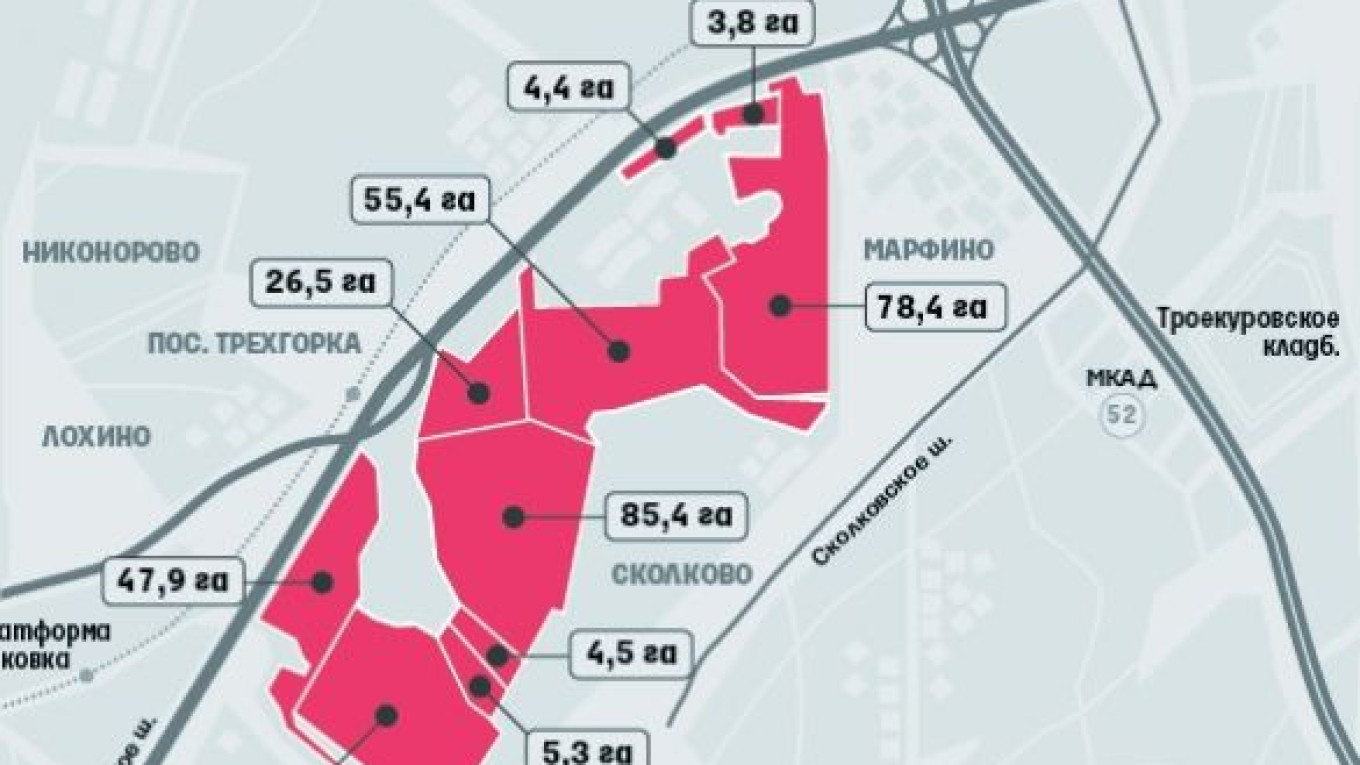The 4 billion rubles originally earmarked for the so-called innovation city in Skolkovo was just the beginning. In the federal budget, another 110.5 billion rubles ($3.5 billion) has been set aside for the project, mostly for construction.
According to calculations provided by the Finance Ministry and the Cabinet in the budget for 2011, 110.5 billion rubles will be set aside for the project through 2015. "These are requests that have come from the presidential commission on modernization," said a ministry official, who added that the sum would likely be adjusted downward.
The president and prime minister will soon have several meetings on expenditures, a source in the presidential administration said, and there will be no separate meeting on Skolkovo. "In any event, this is one of the priority issues," he said.
In the first four years, spending on the "technopolis" (the term used by the Finance Ministry to refer to the project) will consistently grow, and only in 2015 will expenditures decline, to 8.5 billion rubles. These figures correspond to the requirements of the foundation managing Skolkovo, said an employee close to the management of the foundation, but much depends on the level of co-financing of innovative projects.
A discussion is ongoing over whether state expenditures will match those of individual investors, or be twice as high.
Viktor Vekselberg, who is coordinating the project, predicted that 50 billion to 60 billion rubles will be needed for the project over the next 2 1/2 years and said that while there are no co-investors, all that money will have to come from the budget.
The main construction will be carried out from 2011 to 2013, and this will be the main cost, an Economic Development Ministry official said.
Most of the budget money will go to construction, including infrastructure, a high-ranking Kremlin official said, although a significant amount is planned for projects and sciences.
Between 25,000 and 30,000 people will live in the technopolis, Vekselberg has said, and there is a preference for low-rise buildings.
"Supermodern architecture and design — domestic comforts," said Vladislav Surkov, the Kremlin's curator of the project.
Experts' calculations show that the cost of housing and offices for the indicated number of workers in the technology hub is much less than 110 billion rubles and shouldn't exceed $1 billion.
Artyom Tsogoyev, managing partner of the Moscow Central Real Estate Exchange, said providing business-class housing to 30,000 people requires about 600,000 square meters, which should cost about $600 million. One worker needs about 4 square meters of office space —? this is the European minimum. In the average three-person family there are two who work, meaning that at least 80,000 square meters of offices are needed, which should cost about $80 million.
Making a separate program for financing Skolkovo can be done, but it takes time, said Alexander Kogan, deputy head of the State Duma's Budget and Taxes Committee. It's simpler just to channel the funding through already existing channels, such as the Investment Fund, the Housing Development Fund and the housing program. Skolkovo is just the next step on the road to modernization.
Skolkovo's funding will be commensurate with its importance: Similar budget infusions are being received by other priority programs, such as Far East development and preparation for the 2014 Winter Olympics in Sochi.
The federal target fund for creating a high-tech technology park will cost 7.65 billion rubles from 2007 to 2010. A total of 553.4 billion rubles was set aside for the program for developing Vladivostok in 2008-12.
With a budget deficit and severe cost cutting, it's better to put budget money toward programs that have already demonstrated their effectiveness and invest in sectors that are actively developing and have access to external markets, said Yevsei Gurvich, head of the Economic Expert Group.
It's evident that this is an attempt to force innovation from above, but there are not yet any signs that there will be any return, Gurvich said.
Anatoly Chubais, CEO of Rusnano and a member of the working group for creating the innovation city, estimated that the output of innovative products from the first 10 projects will reach 100 billion to 200 billion rubles by 2015, and if production is really ramped up, it could reach 1 trillion rubles per year.
About 40 projects have been submitted to the presidential commission for modernization, said a source close to the commission's leadership.
A Message from The Moscow Times:
Dear readers,
We are facing unprecedented challenges. Russia's Prosecutor General's Office has designated The Moscow Times as an "undesirable" organization, criminalizing our work and putting our staff at risk of prosecution. This follows our earlier unjust labeling as a "foreign agent."
These actions are direct attempts to silence independent journalism in Russia. The authorities claim our work "discredits the decisions of the Russian leadership." We see things differently: we strive to provide accurate, unbiased reporting on Russia.
We, the journalists of The Moscow Times, refuse to be silenced. But to continue our work, we need your help.
Your support, no matter how small, makes a world of difference. If you can, please support us monthly starting from just $2. It's quick to set up, and every contribution makes a significant impact.
By supporting The Moscow Times, you're defending open, independent journalism in the face of repression. Thank you for standing with us.
Remind me later.


